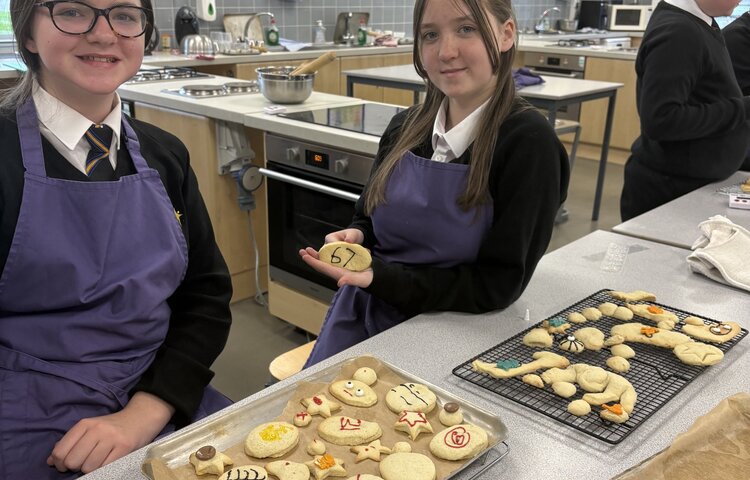Food Preparation & Nutrition
Intent
“Imagine a world where... every child was educated about how amazing food is, where it comes from, how it affects the body and how it can save their lives.” Jamie Oliver
At Penwortham Priory Academy the Food Preparation and Nutrition curriculum teaches pupils how to cook and apply the principles of good nutrition and healthy eating. Instilling a love of cooking in pupils can open a door to one of the great expressions of human creativity. Learning how to cook is a crucial life skill that enables pupils to feed themselves and others affordably and well, now and in later life. We believe we have a moral responsibility to educate our young people so that they are empowered to take charge of their own diets and health.
Through food preparation and nutrition, students build on prior learning from Key Stage 2 to broaden their understanding and application of the principles of good nutrition and health, cook safely and widen their repertoire of predominantly savoury dishes. They are challenged to learn through the use of ‘BIG Questions’ and are required to think hard in lessons. The curriculum encourages them to develop their leadership and organisational skills through practical tasks opportunities to lead and organise food-based events with support. Students are expected to show resilience, becoming increasingly competent in the kitchen, showing initiative by adapting and using their own recipes over time and demonstrating their growing knowledge through their written and verbal communication.
Pupils are given an overview of their learning journey at the start of their unit of work so that they know what they’ll be learning and the skills they’ll develop. This helps them understand how this subject links to others, why they need to know something and how they’ll learn it. We also share ideas for broadening their reading around the subject. We celebrate the cuisines of the world in our lessons and our clubs, enabling pupils to appreciate the origins of the many dishes that have influenced their own cultures.
The curriculum is sequenced to build on existing knowledge and incrementally develop new knowledge – pupils can see this in the learning journey and personal learning checklists. Spaced retrieval, low stakes testing, and repeated practice are used to ensure that concepts are understood, and knowledge remembered. We place emphasis on the acquisition of tier 2 and tier 3 vocabulary, modelling and explaining this in our teaching and facilitating exposure to it using ‘real-life’ reading texts, journals, websites and relevant articles.
In addition to the diverse and rich opportunities offered through the teaching, we value opportunities to take pupils out on trips and visits to enhance the curriculum and we enjoy inviting relevant specialists in such as food producers, farmers, college leaders and chefs. Extra-curricular opportunities such as master classes, creative cookery and competitions are offered to pupils and staff.
Teachers of Food Technology and Nutrition
Mrs L Cowell, Vice Principal
Mrs E Lockwood, Technology Teacher
Lessons
Yr 7 – 1 hour per week for one term per academic year – Approx. 12-14 hrs
Yr 8 - 1 hour per week for one term per academic year – Approx. 12-14 hrs
Yr 9 - 1 hour per week for one term per academic year – Approx. 12-14 hrs
Yr 10 - 3 hours per week at GCSE following AQA Food Preparation and Nutrition
Yr 11 - 3 hours per week at GCSE following AQA Food Preparation and Nutrition
Food Preparation & Nutrition Curriculum
Attainment and Progress (national tests and assessments)
2024 GCSE Food Preparation & Nutrition Outcomes
|
Subject |
9 - 7 % |
9 - 5 % |
9 - 4 % |
|
Food Preparation |
6 |
33 |
78 |
Extra Curricular Clubs
- KS3 - Run monthly in a workshop / course style where there is a specific product or theme e.g. samosas, national carrot day. These are free events for 12-15 pupils run after school.
- KS4 - High skills workshops run after school to enhance the GCSE course
- Staff - one off events to enhance wellbeing and build skills e.g. gingerbread house making and decorating
- Summer school food activities annually
House Competitions
- Annual pancake flipping competition
- Best scones competition every June
- Other competitions in response to national / international events e.g. Olympics
Trips and Visits
- Paris trip for Year 7 & 8 in September 2024
- Intention of a cheese or dairy factory visit in conjunction with the IT and Business Department
- College visits to catering departments for GCSE pupils
Cultural Experiences
- Annual workshop to coincide with Culture Day
- Visiting volunteers do demonstrations for pupils
Where can studying Food Preparation & Nutrition take you?
Related News
Year 7 Serve Up Success in Their First Practical Cookery Lesson
Year 7 stepped into the kitchen for their very first practical Food Technology lesson.
Year 8 Enjoy Spooky Biscuit Creations at Mrs Lockwood’s Cookery Club
Year 8 pupils got creative with their Biscuit Showstoppers on a Halloween theme.

